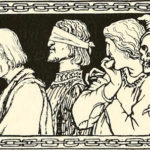We run our website the way we wished the whole internet worked: we provide high quality original content with no ads. We are funded solely by your direct support. Please consider supporting this project.

The Sine Qua Non of the Kingdom
In contrast to the habit of judgment which I challenged in the previous post, God calls his people to love the way that God loves. But what exactly does this mean? People have a lot of screwy ideas about “love” today. We use the word “love” to mean a lot of different things, from sexual intercourse (“making love”) to affection for objects (“I love my iPhone”) to friendship (“I love my friends at the bar”) to personal affirmations (“I love your new hair style”).
Thankfully, the Bible removes all ambiguity surrounding the word “love” by pointing us to the cross. “This is how we know what love is,” John says, “Jesus Christ laid down his life for us. And we ought to lay down our lives for one another” (1 John 3:16). This is the kind of love that defines God’s eternal nature, and this is the kind of love we are empowered to express to all others when we become his children.
In fact, manifesting Calvary-like love is the defining mark of a child of God, which is why Jesus taught us to love even our enemies “that you may be children of your Father in heaven.” Our Father loves indiscriminately – like the rain falls and the sun shines – and we make it clear that we are “born from above” when we manifest this love (Matt 5:44-45).
Along the same lines, manifesting indiscriminating love is the most basic distinguishing mark of the kingdom of God. We enthrone Christ as King of our life when we agree with him that each and every person was worth him dying for and that each and every person therefore has unsurpassable worth, totally apart from any assessment of their moral character. This is precisely why a kingdom person must follow Jesus example to the point where they are willing to be killed at the hands of threatening enemies rather than judging them to be unworthy of life by killing them in self-defense.
This radical Calvary-like love seems foolish, if not immoral, to the world, which shouldn’t surprise us since this is how the message of the cross strikes the world (I Cor 1:18, 24). And yet, manifesting this kind of love is the sina qua non of the kingdom. According to Paul, it is impossible for any activity, however impressive, to have any kingdom value if it lacks this kind of love. You can speak in tongues, give prophecies, have incredible insights into God’s greatest mysteries, possess all knowledge, manifest miracle-working power, and even appear to make great sacrifices for others, but if these things are not motivated by Calvary-like love, Paul says they are altogether worthless. The only thing that matters, Paul adds, is “faith expressing itself through love” (I Cor 13:1-3).
To the degree that the cruciform God reigns in an individual or a church, they will look cruciform. They will be expressing the unsurpassable worth of all others by sacrificing on their behalf – even when these others are threatening enemies. They will, in short, love others in the same self-sacrificial way Jesus loved them.
Photo via VisualHunt.com
Category: General
Tags: Cross, Judgment, Love
Topics: Following Jesus
Related Reading

Sin-Bearing God
On the cross, God became our sin, as Paul wrote: “God made him who had no sin to be sin for us” (2 Cor 5:21). However, God didn’t begin to be a sin-bearing God when Jesus walked the earth and hung on the cross. Rather he became Incarnate and bore our sins on the cross…

The Cross Reveals God’s Love
The central way Christ functions as the perfect image and exact representation of God is by dying on the cross. While Christ’s entire life manifests the true God, Christ came primarily to die. It was his death that defeated the devil and freed us from bondage. The one who does what is sinful is of…

The Rule of Love
The traditional confession that Scriptura sacra sui ipsius interpres (“Sacred Scripture is its own interpreter”) presupposes that there is one divine mind behind Scripture, for example. Moreover, Church scholars have traditionally assumed that Scripture’s unity can be discerned in a variety of concepts, motifs, themes and theologies that weave Scripture together. And to speak specifically of the…

Why Are We So Mired in Violence?
In his marvelous little book entitled The Great Divorce, C. S. Lewis envisioned hell as a realm in which people are forever moving farther away from one another. Hell is the ultimate, cosmic, suburban sprawl! It seems to me that Western civilization is diving headlong into Lewis’ hell, and we’re being pulled there by the…

Sending Evil Spirits
In several infamous biblical depictions of Yahweh in the Old Testament, God is depicted as “sending” spirits to trouble and/or deceive people (Judg 9:22-3; 1 Sam 16:14, 23; 18:10; 19:9; 1 Kg 22:20-3). While there are several exegetical considerations that arguably help alleviate the problematic way these passages implicate God in unethical behavior, I nevertheless…
